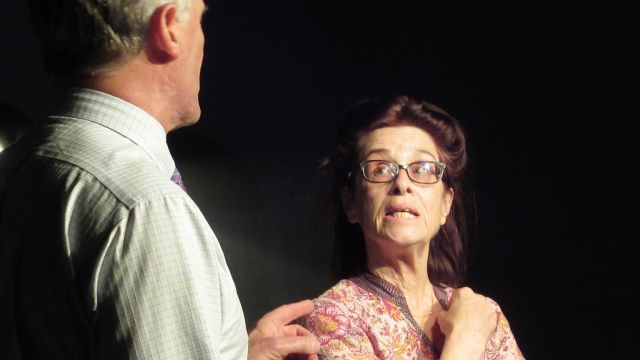Giving Up the Ghost
It is an exciting thing to attend an opening night, even more so a world premiere of an Australian comedy, in a brand-new venue.
The ground level of Limelight on Oxford had a warm inviting feel, with tasteful but fun décor, including an upright piano. This level serves food and drinks, and operates as a café during the day. It is wheelchair accessible, with a wheelchair-accessible bathroom.
You then follow the magic staircase (coloured floor lights) up a level to the lounge bar. The seating ranges from couches to tables and chairs, with a view of the treetops outside. Again, the décor is tasteful, and just a little bit quirky.
The performance space is up another two flights of stairs, made more glamorous by a chandelier. Unfortunately, the lounge bar and performance space aren’t yet wheelchair accessible.
You enter the performance space through the set, which is a novel experience. Even more novel was the set itself, with a prominently placed coffin.
The audience seating is raked, so there are no issues with sightlines. And as the theatre is small, you have a good view of the stage no matter where you’re sitting.
 The play, by well-known and respected playwright and director Rivka Hartman, was developed with dramaturg Alice Ansara, and workshopped with the cast. The cast is headed by Elaine Hudson and Chris Orchard, both high-profile and admired actors, with Madeleine Withington playing their daughter, and Andrew Wang her boyfriend.
The play, by well-known and respected playwright and director Rivka Hartman, was developed with dramaturg Alice Ansara, and workshopped with the cast. The cast is headed by Elaine Hudson and Chris Orchard, both high-profile and admired actors, with Madeleine Withington playing their daughter, and Andrew Wang her boyfriend.
It is a brave thing to write a play about euthanasia, especially a comedy. Whenever there is death in a play, the stakes are much higher, and with a recent death, higher still. Humour is essential when dealing with dark subjects, but it can be difficult to get the right balance.
The play had two themes, parental control / influence, and euthanasia. It also looked at the generation communication gap, with the “YouthSpeak” of the younger characters being translated by the daughter.
The publicity describes the play as being about euthanasia, but the parental influence element seemed to be the focus of the play. These two elements didn’t entirely gel, and the focus on laughs took away from viewpoints on euthanasia. I found the text messages and phone calls slowed the action. The device of a character not being heard, or needing to be interpreted, also slowed the pace. And the amount of YouthSpeak seemed more appropriate to much younger characters.
The set worked well, and together with the costumes, props and lighting, added visual interest to the black box space (black walls and floor). The music also added to the production.
The opening night audience loved the play, laughed many times during the performance, and applauded enthusiastically. The people behind me thought the play was great, and particularly enjoyed the humour with YouthSpeak. Another audience member confided that he often fell asleep during plays, but never at a play by Rivka Hartman.
Vanessa Cruise
Photographer: Owen Munn
Subscribe to our E-Newsletter, buy our latest print edition or find a Performing Arts book at Book Nook.

